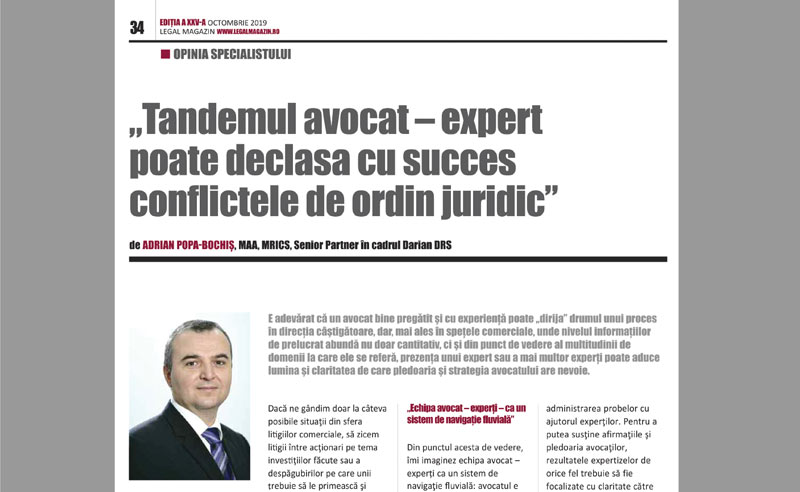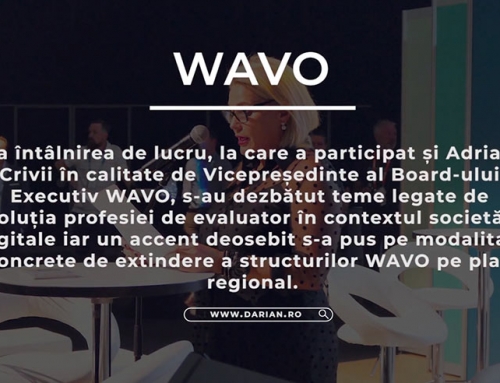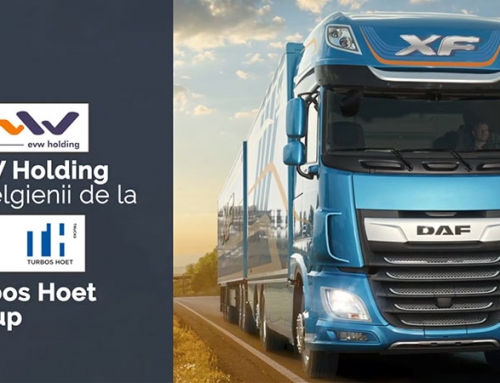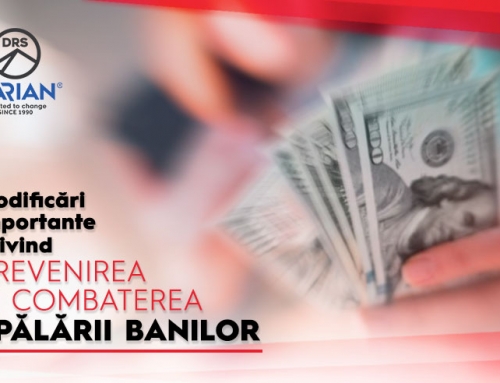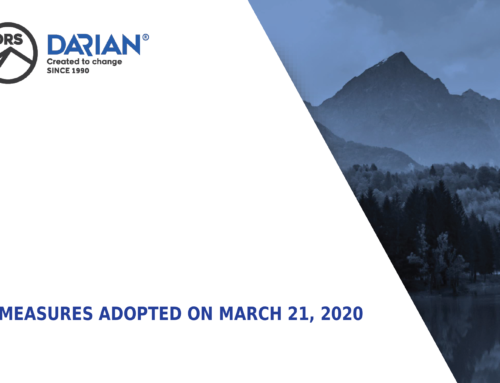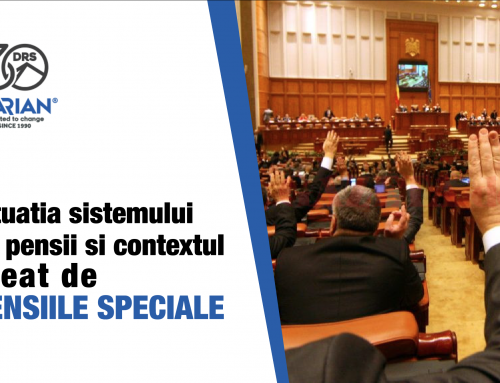It is true that a well-trained and experienced lawyer can “direct” the path of a trial in the winning direction, but especially in commercial cases, where the level of information to be processed abounds not only quantitatively, but also in terms of the multitude of fields to which they refer, the presence of one or more experts can bring the light and clarity that the lawyer’s plea and strategy needs.
If we only consider a few possible situations in the field of commercial litigation, let’s say disputes between shareholders regarding the investments made or the damage compensation that some have to receive and then go to the area of tax litigation related to the deductibility of VAT or the expenses for calculating the profit tax, ending in the area of labour disputes between shareholders and management, clients’ expectations are aimed at the lawyer facing all the challenges required for the recognition of justice as being on their side.
In these situations, the best and most experienced of the bar members understand that the chances of winning such a case lie in the way they build not so much their strategy and evidence, but especially the team of experts who will guide the conduct of the procedure.
“The lawyer – experts team – as a river navigation system”
From this point of view, I imagine the lawyer – experts team as a river navigation system: the lawyer is the pilot who knows how to handle the boat’s commands with mastery, and the experts are the headlamps that bring light, guidance and precision in the way in which the pilot does his job.
The lawyer-expert team demonstrates its reason for existing when the two manage to build a structure that the conclusions of the experts appointed by the court come to support and confirm in order to validate the requests, statements or actions that led to the occurrence of the legal conflict. One of the key moments of the commercial or fiscal trials is sample management with the help of experts. In order to support the assertions and pleadings of lawyers, the results of any kind of expertise must be clearly focused on those points that need to be elucidated or demonstrated. Here I think it is the moment when a good expert-assistant can make his/her substantial contribution, by the way he/she manages to formulate, together with the lawyer, the requests and the objectives of the expertise submitted to the judges. But, for this, it is necessary that the assistant-expert be involved from this stage in the knowledge of the case and of all the information in the file, in order to be able to filter, analyse based on his/her expertise and experience the available data and, respectively, to formulate as exactly as possible the purpose of work for the appointed expert.
“High-level expertise and high-level deontology”
There are two elements absolutely necessary for this lawyer-expert team to work. The first is the correct selection of the area of expertise. It is very important to involve the area of expertise correctly in order to have the right questions and the right goals. Too many times, I have seen objectives connected to the cadastral field required from valuation experts, business valuation or taxation objectives required from accounting experts, or, from another perspective, I have seen value estimation objectives required, when the essence of the case was the demonstration of physical existence, of the quantities or of the lack of elements from the composition of a newly constructed building.
The second absolutely necessary element: the definition and concentration of some liberal professions, based on most clearly defined areas of expertise, which, in the future, can generate high-level expertise and high-level deontology. If the liberal professions can manage to accomplish the two attributes, they enjoy recognition and respect. Then we can talk about a better collaboration in the team we are talking about: lawyer – expert.
The valuation experts estimate values, they do not have in their area of qualification the technical expertise of the assets or the accounting expertise of the companies. But valuation experts can estimate the value of immovable or movable property, of business, of business parts, of business lines, of intellectual property elements or of intangible assets. And, very important, they can check valuation reports or the expertise performed by other valuers.
All of these are achieved on the basis of a set of valuation standards, which guide and recommend based on best international practices. This set of standards, which was created internationally by IVSC, was taken over and adapted (with relatively few changes) to the reality of the Romanian economy by the authority that regulates the activity of valuation of assets in Romania, ANEVAR (National Association of Romanian Authorized Valuers).
Across the country, with a number of about 4,000 individuals and about 500 corporate members trading companies, with a personal estimate that about 2,000 members, most of them grouped in the 500 companies that are corporate members, are the ones actually living from this liberal profession, the level of expertise and experience are quite unequally divided both geographically and within a certain area, which is absolutely normal for a liberal profession that functions as a living organism: new members (trainees) appear, qualified members specialize (growth – development), obtain the degree of accredited members (maturation) and retire at an old age.
“ANEVAR Accredited Members, most suitable for mixed teams”
In order to be able to provide solutions and effectively support clients in the special situations in which they almost always find themselves when it comes to litigation, it is necessary to bring in those experts with high specialization and significant experience. ANEVAR has long implemented a system of life-long professional training and improvement. In this sense, the Association recognizes for the most qualified and experienced valuers the status of ANEVAR (MAA) Accredited Member following an examination that must be promoted after at least 5 years of experience as authorized valuer, with re-accreditation after passing an examination every 5 years. From my personal experience, I say that this exam has never been a simple one, and that it has respected its business card as gateway to the area of excellence. The accredited members may be, in my opinion, the most recommended to participate in this mixed team of liberal professions along with lawyers, tax experts, technical experts and accounting experts.
The accreditation of the authorized valuers has been thought of as a higher qualification stage, so that there is a differentiation that both clients and users of reports can perceive and access as needed. The involvement of an accredited valuer as expert-party/expert-assistant, in a team with the lawyers of the party and other liberal professionals, is an essential prerequisite for a quality service, which will help in solving the case.
An aspect that is still less known by the economic and legal environment is the possibility of checking an existing valuation report. This solution can be one that speeds up the process of solving cases, where the case is based on a valuation or legal expertise in the field of assets valuation. It is much easier to verify the existing report, with a conclusion regarding the way in which to comply with the legal requirements in its drafting (the so-called simple objective of verification), and only under the conditions where major non-conformities, which influence the value estimated in the initial report/expertise are found, to proceed with the estimation of a new value (extended objective of verification). There is a body of verifiers, valuers with at least 5 years’ experience, similar to the accredited members, who have acquired the qualification of verifiers of valuation reports after passing an equally selective exam.
Along with the expert valuers, especially in tax litigation, an important role in the team built to support a client’s cause could be also played by a tax consultant. Although it seems that the usual practice is to ask chartered accountants to participate in everything related to the economic life of companies, in the cases where the stake is related to taxes and duties the specialization of tax consultants qualifies them with priority in interpreting the specifications of the tax legislation and transposing in a much clearer way for the legal specialists (lawyers or judges) the financial-accounting events and documents, and at the same time, it gives them the possibility to explain to economists the mechanisms and the results from a fiscal point of view.
Legal Magazin www.legalmagazin.ro
by Adrian Popa-Bochiş
MAA, MRICS, Senior Partner, COO within Darian DRS



Suntem soluția eficientă în oferirea de servicii complexe de evaluare și consultanță pentru clienții corporativi. Echipa noastră de specialiști asistă clienții în soluționarea diverselor spețe cu impact fiscal.

